Sorry To Bother You
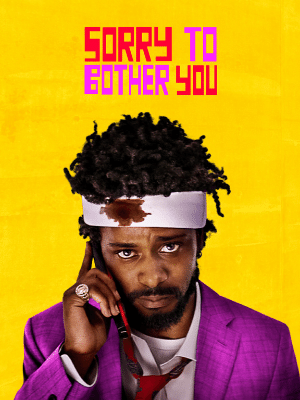
R, 2018, Sci-Fi/Comedy, 1h 45m
Table of Contents
What Is Sorry To Bother You About?
A telemarketer struggles with his success, until he discovers the key to being impressively convincing.
Why You Should Watch Sorry To Bother You
Sorry to Bother You is unlike anything you’ve seen before. It’s a movie that grabs your attention with its creativity and keeps you hooked with its unexpected twists and turns. From the first scene, it’s clear this is not just another predictable story. It’s bold, imaginative, and constantly surprising, making it one of the most memorable films of the last decade.
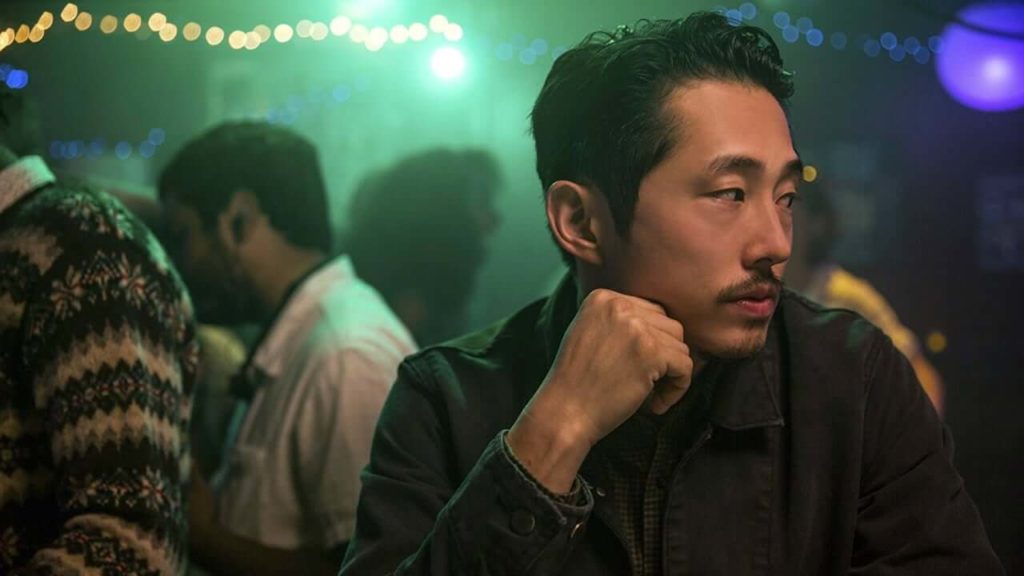
The story is engaging from the start. Cassius “Cash” Green, played brilliantly by Lakeith Stanfield, is an everyman trying to get by in a world that seems stacked against him. His journey feels relatable: he wants to pay his bills, take care of himself, and feel like he’s doing something meaningful with his life. But as his telemarketing job takes a strange and unexpected turn, the plot evolves into something you couldn’t predict if you tried. Every step of Cash’s journey reveals a new layer to the world he inhabits, and it’s impossible to look away as things escalate.
The film’s humor is another reason to watch. It’s sharp, dark, and often laugh-out-loud funny, but it also makes you think without being heavy-handed. The jokes feel fresh and clever, using absurdity and exaggeration to point out things about the world we live in. At the same time, it’s not a movie that takes itself too seriously—it knows when to be weird, when to be funny, and when to throw you off balance.
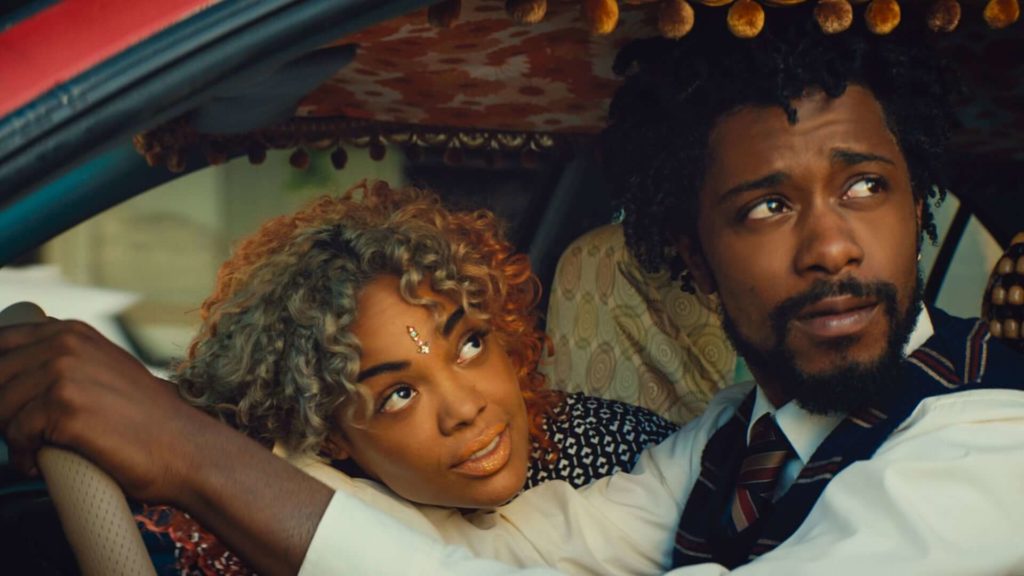
The characters are also a big draw. Lakeith Stanfield gives a magnetic performance as Cash, making him someone you root for even when he makes questionable choices. Tessa Thompson as Detroit is equally compelling, bringing passion and humor to her role as Cash’s girlfriend and a fiercely independent artist. Armie Hammer is disturbingly charismatic as the unhinged CEO Steve Lift, while Steven Yeun, Jermaine Fowler, and others round out the cast with performances that feel authentic and lively. Every character brings something unique to the story, and watching their interactions is a huge part of what makes the movie so entertaining.
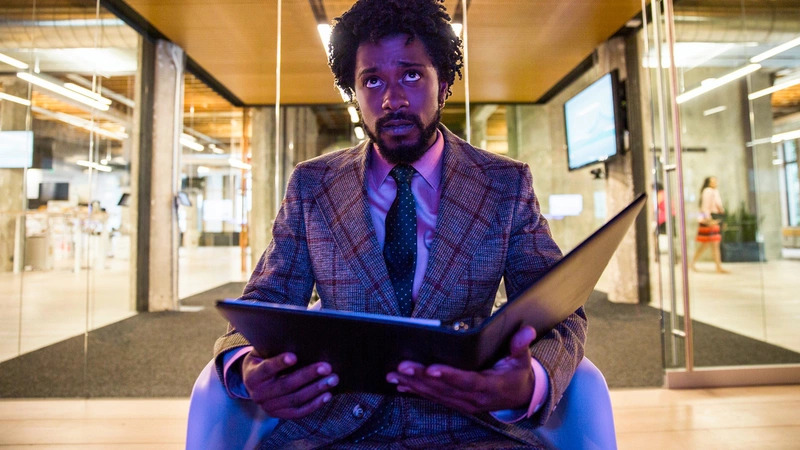
What sets Sorry to Bother You apart is its creativity. This is a film that isn’t afraid to take risks or be unconventional. It introduces unexpected elements—things you wouldn’t expect in a workplace comedy or a drama about everyday struggles. Just when you think you know where the story is headed, it shifts into something completely different. This unpredictability keeps you on the edge of your seat, making it an exciting and rewarding experience.
Sorry to Bother You is a movie that stays with you. Long after the credits roll, you’ll find yourself thinking about the story, the characters, and the choices they made. It’s the kind of film you’ll want to talk about with friends or watch again to catch details you might have missed. It’s thought-provoking, hilarious, and completely original—a must-watch for anyone looking for something bold and different.
The Theme of Sorry To Bother You
Sorry to Bother You by Boots Riley is a bold and surreal film that tackles big issues like capitalism, racism, and power. At its heart, the movie is a critique of how modern systems exploit people and force them to choose between survival and integrity. Through its humor and absurd imagery, the film delivers a sharp message about inequality and resistance.
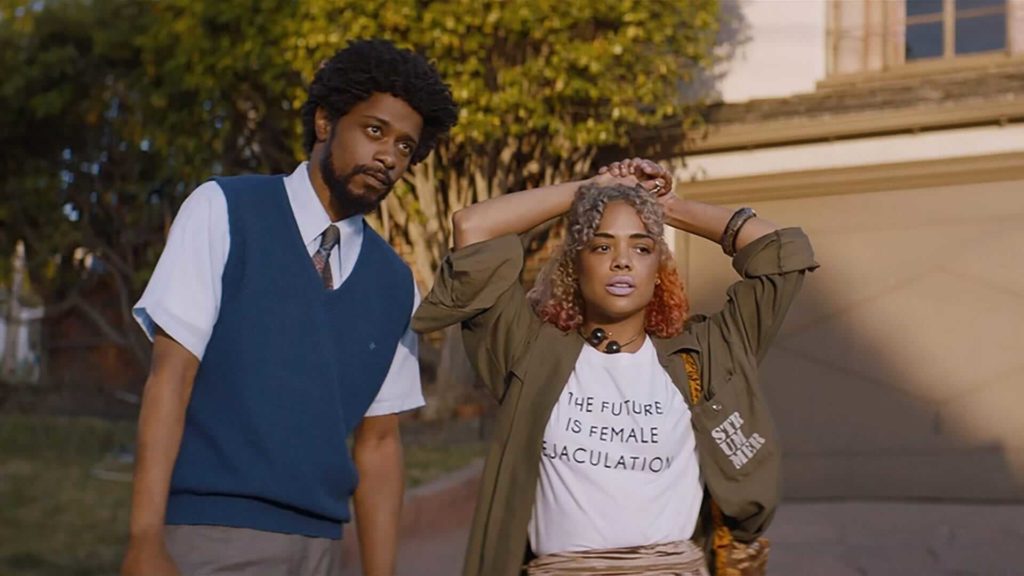
One major theme in the movie is economic exploitation. The main character, Cassius “Cash” Green, struggles to make a living as a telemarketer. He discovers that using a “white voice” helps him climb the corporate ladder, leading him to a high-paying job as a “power caller.” However, this success comes with a price—Cash becomes part of a system that profits by exploiting others, including selling slave-like labor through a company called WorryFree. WorryFree promises free housing and food to its workers, but it’s really just a cover for modern-day indentured servitude. The film paints a disturbing picture of how corporations dehumanize workers in the name of profit.
The movie also explores racial identity and code-switching. Cash uses a “white voice” (voiced by David Cross) to sound more appealing to clients, which helps him advance in his career. This voice symbolizes the pressure many Black people face to conform to white-dominated spaces to succeed. By adopting this persona, Cash sacrifices part of his identity. The film critiques the systemic racism that makes assimilation a requirement for economic mobility and highlights how people of color often feel forced to mask who they are just to survive in such systems.
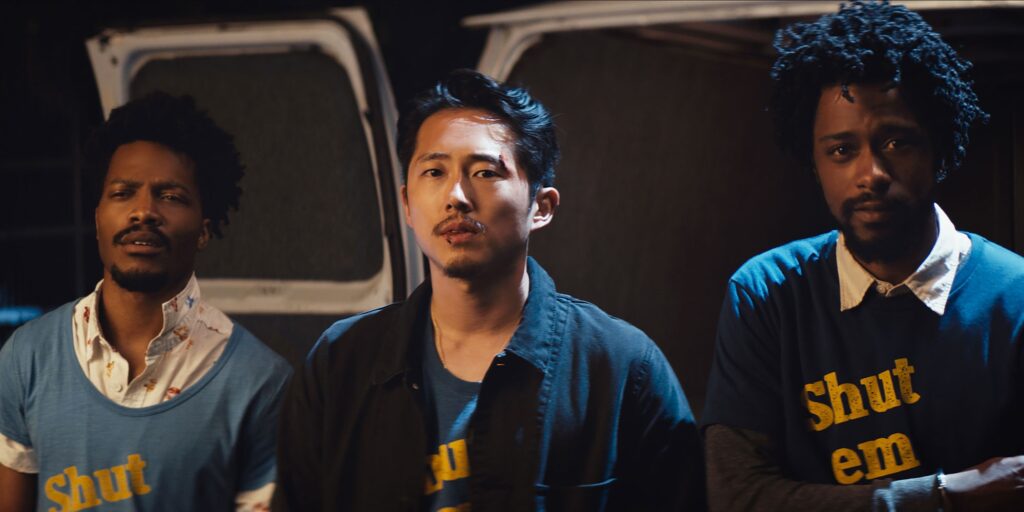
Another key theme is the corrupting nature of power. As Cash rises in the corporate world, he becomes consumed by the wealth and privileges that come with it. He begins to turn his back on his friends, his girlfriend Detroit, and the injustices around him. The deeper Cash gets into RegalView’s top ranks, the more he sees the dark side of the company. This includes a horrifying plan by RegalView’s CEO, Steve Lift, to turn workers into “equisapiens,” human-horse hybrids designed to work harder and longer. This extreme storyline drives home the film’s point about how far corporations will go to exploit workers for profit.
Lastly, the movie emphasizes collective resistance. While Cash initially chooses personal success over fighting for justice, his friends and coworkers organize a union to protest the company’s unfair treatment. This subplot highlights the power of solidarity and standing up to oppression together. Eventually, Cash joins their fight, realizing that collective action is more important than individual gain.
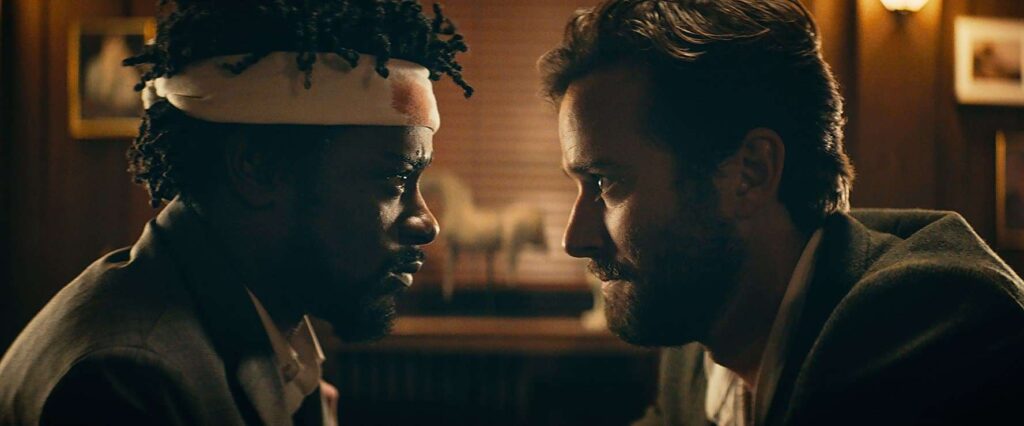
Sorry to Bother You uses its unique style and humor to address serious issues like worker exploitation, systemic racism, and corporate greed. The film challenges viewers to think about how these systems operate in the real world and encourages them to imagine a better, fairer society where people come together to fight for change.
The Cinematography of Sorry To Bother You
This movie’s camera work, directed by Boots Riley and shot by Doug Emmett, is impressive. They use colors and angles in a way that really adds to the story, making the movie not just about the story, but also about how it looks and feels.
At the start, the film is full of bright colors like reds, purples, and blues. This really shows the simple, happy life of the main character, Cassius “Cash” Green, even though he doesn’t have much money. These colors make the movie look great and also show a big change later on.
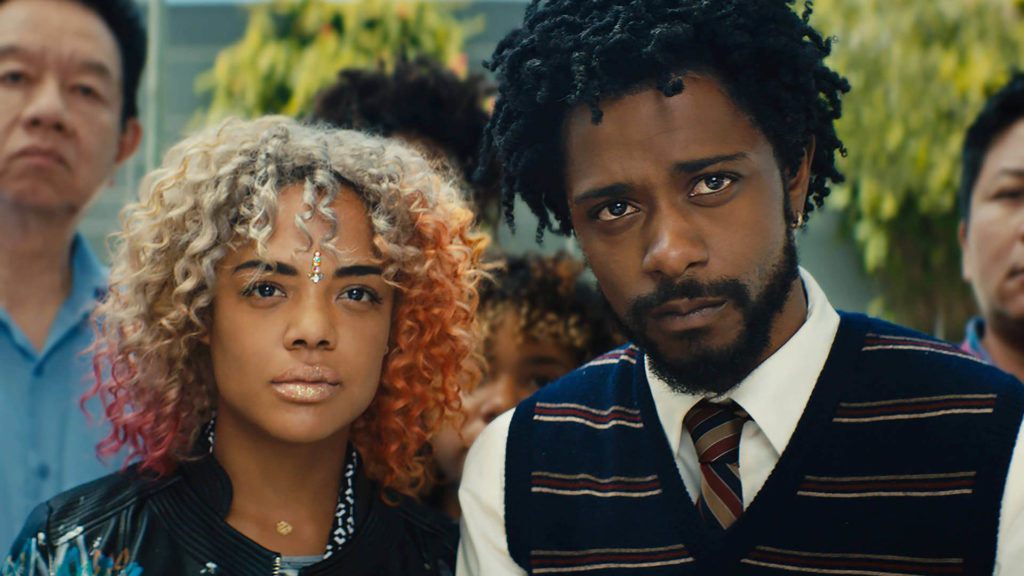
When Cash starts doing better in his job, the colors in the film change to less vibrant, more dull tones. This shows how Cash’s life changes as he gets more involved in the corporate world. It’s like the movie is showing us how chasing money and success can make life less colorful and happy.
The way the film is shot is really engaging, with close-up shots and smooth changes between scenes. Every detail, from the clothes to the makeup, adds to the story. This makes the movie’s message about society and its problems even more powerful.
The Soundtrack of Sorry To Bother You
The was mainly created by The Coup, is key to the movie’s storytelling. It mixes hip-hop and funk with meaningful lyrics, adding to the film’s satire with its lively and bold music.
Some of the most notable songs from the soundtrack include:
- “The Sun Explodes” (feat. Omari Hardwick) by The Coup
- “Victors of the Age” by The Coup
- “Hey Saturday Night” by The Coup
- “Crawl Out the Water” by The Coup
- “We Ready” by The Coup
- “Wash Me Up” by The Coup
- “Monsoon” by The Coup
- “Whatthegirlmuthafuckinwannadoo” by The Coup
- “Nigga Shit” (feat. Lakeith Stanfield) by The Coup
In my view, the soundtrack is more than background music; it’s key in establishing the film’s tone and mood. The Coup’s lively and stirring songs, like “Hey Saturday Night” and “We Ready,” add a rebellious and daring feel to the story. Their music reflects the movie’s themes of defying social norms and resisting capitalist exploitation.
The use of Lakeith Stanfield’s vocals in “Nigga Shit” adds a layer of authenticity and connection to the character he portrays in the film. This choice blurs the lines between the character’s world and the real world, enhancing the viewer’s engagement with the story.
The soundtrack received critical acclaim, with Metacritic assigning it an average score of 80 based on 15 reviews, indicating “generally favorable reviews.” It was also recognized by PopMatters, placing it at number 5 on the “Best Hip-Hop of 2012” list, and the Los Angeles Times ranked it at number 8 on their “Best of 2012 Pop Music: Albums” list. This recognition speaks to the quality and impact of the soundtrack, which not only serves the narrative but also stands on its own as a powerful piece of music.
The Cast of Sorry To Bother You
- Lakeith Stanfield as aCassius “Cash” Green: The film’s protagonist who starts out as a struggling telemarketer and rises through the ranks of the company with the help of his “white voice.” Lakeith is also great in Get Out.
- Tessa Thompson as Detroit: A performance artist and Cash’s girlfriend and artistic partner.
- Jermaine Fowler as Squeeze: A fellow telemarketer and union organizer who works alongside Cash.
- Omari Hardwick as Mr._______,: The powerful and mysterious CEO of the telemarketing company.
- Steven Yeun as CEO Steve Lift: A successful telemarketer and Cash’s mentor.
- Armie Hammer as Steve Lift’s boss: The powerful and ruthless head of the corporation.
- Terry Crews as Langston: A veteran telemarketer who takes Cash under his wing.
- Danny Glover as Uncle Sergio: Cash’s uncle who is also a telemarketer and union supporter.
- Patton Oswalt as Mr. _____’s white voice: Provides the white voice for Mr. _____.
- Kate Berlant as Diana DeBauchery: A character in the WorryFree company.
The Filmmakers of Sorry To Bother You
- Boots Riley – Writer, Director, and Producer
- Nina Yang Bongiovi – Producer
- Forest Whitaker – Producer
- George Rush – Co-Producer
- Jonathan Duffy – Co-Producer
- Kelly Williams – Co-Producer
- Jonathan Walker – Executive Producer
- Annapurna Pictures – Distributor in North America

Utica Greens

Inspiration
Protagonist, Cassius Green
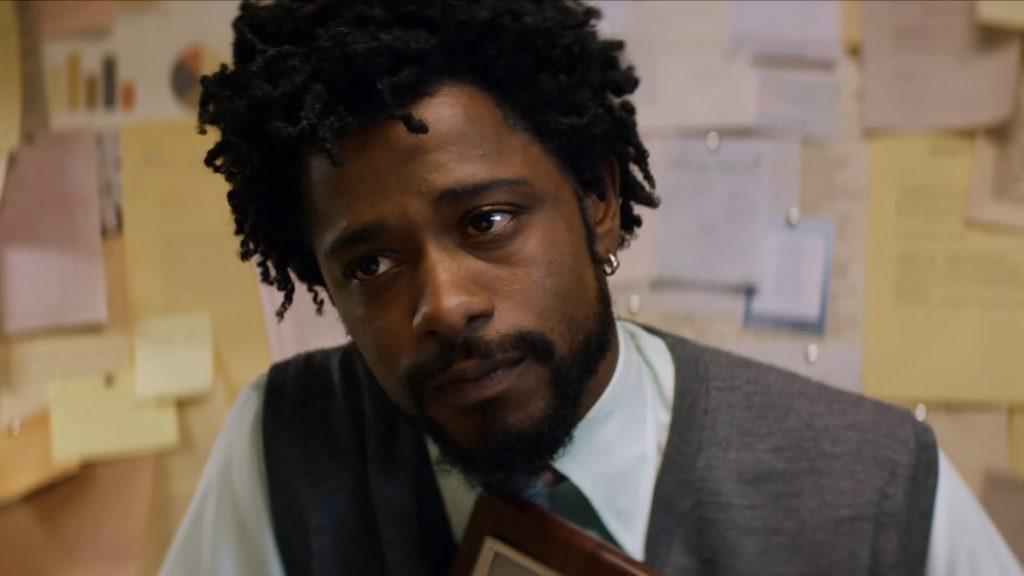
More About Sorry To Bother You
Sorry to Bother You was primarily filmed in Oakland, California. The city serves as the backdrop for the film’s dystopian future setting and its vibrant and diverse culture is prominently featured throughout the film. The film’s director, Boots Riley, is an Oakland native and wanted to showcase the city’s unique character and spirit in the film. The film also utilized several iconic locations in Oakland, including the historic Fox Theater and the Grand Lake Theater, as well as several of the city’s distinctive neighborhoods and street scenes.

